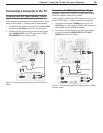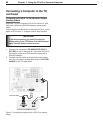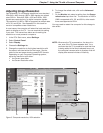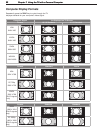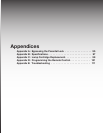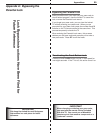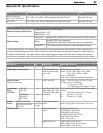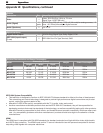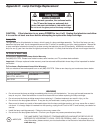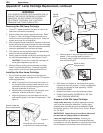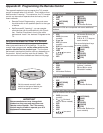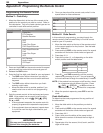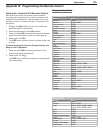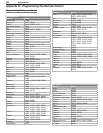
Appendices 97 Appendices 97
Appendix B: Specifications
Inputs
Description Qty. Signal Type Input Specifications
Antenna/Cable input 2 RF F connector, 75-ohm
HDMI (digital video/audio)
2 HDMI EIA-861B stan-
dard for digital audio
and video
HDMI standard connector
Video: 60 Hz: 480i, 480p, 720p, 1080i
24 Hz, 30 Hz, 60 Hz: 1080p
Audio: PCM stereo
Note: Not for use with personal computers.
Video/S-Video
(one front, two rear)
3 NTSC 480i only Video: RCA Pin Plug, 1.0 V p-p, 75 ohm
S-Video: Four-Pin DIN Plug
Y: 1.0 Vp-p 75-ohm
C: 0.286 Vp-p (burst signal), 75-ohm
Component
Video
(Y/Pr/Pb)
WD-Y57
WD-Y65
2 EIA-770.1 & EIA 770.2
480i, 480p, EIA 770.3
720p and 1080i (video
standards)
RCA Pin Plug (EIA-770.3 Standard Levels and
Timing)
Y: 1.0 Vp-p (includes sync), 75-ohm
Pr: 700 mV p-p, 75-ohm
Pb: 700 mV p-p, 75-ohm
WD-57732
WD-65732
WD-73732
3
Audio
Inputs
WD-Y57, WD-Y65 8 pairs analog left and right
audio
RCA Pin Plug 500 mV (full scale), 43-k ohm
WD-57732, WD-65732,
WD-73732
9 pairs
PC DVI-I Input
1 analog and digital
video
VGA (640 x 480, 60 Hz)
W-VGA (848 x 480, 60 Hz)
SVGA (800 x 600, 60 Hz)
W-SVGA (1064 x 600, 60 Hz)
XGA (1024 x 768, 60 Hz)
1280 x 720, 60 Hz
digital video only SXGA (1280 x 1024, 60 Hz)
1920 x 1080 (24 Hz, 30 Hz, 60 Hz)
WXGA (1360 x 768, 60 Hz)
Model Projection System Lamp
WD-Y57, WD-Y65
WD-57732, WD-65732
DLP, 0.65” chip, 1920 x 1080 pixels with Smooth Picture™ 150-watt VIP type
WD-73732
DLP, 0.843” chip, 1920 x 1080 pixels with Smooth Picture™ 180-watt VIP type
Reception
Channel Frequency Reception
Over-the-Air: VHF 2–13, UHF 14–69
Analog Cable: 1–125
Digital Cable: 1–135
Channel Type*
Over the Air:
Analog NTSC, Digital ATSC with sub-channels (all 18 video formats)
Cable:
Analog NTSC (non-scrambled)
Digital QAM 64 and 256 with sub-channels (non-scrambled)
CableCARD™: Authorized scrambled and non-scrambled digital channels
* Note for Digital Channels: The channel numbers displayed on screen are determined by the broadcaster or cable company and can
vary from the standard frequency number. If there is no channel-number information provided by the broadcaster or cable company, the
TV creates a channel number. The created channel number uses the frequency number as the main channel number and the program
number as the sub-channel number. When using an authorized CableCARD, the channel numbers are determined by the cable company.



